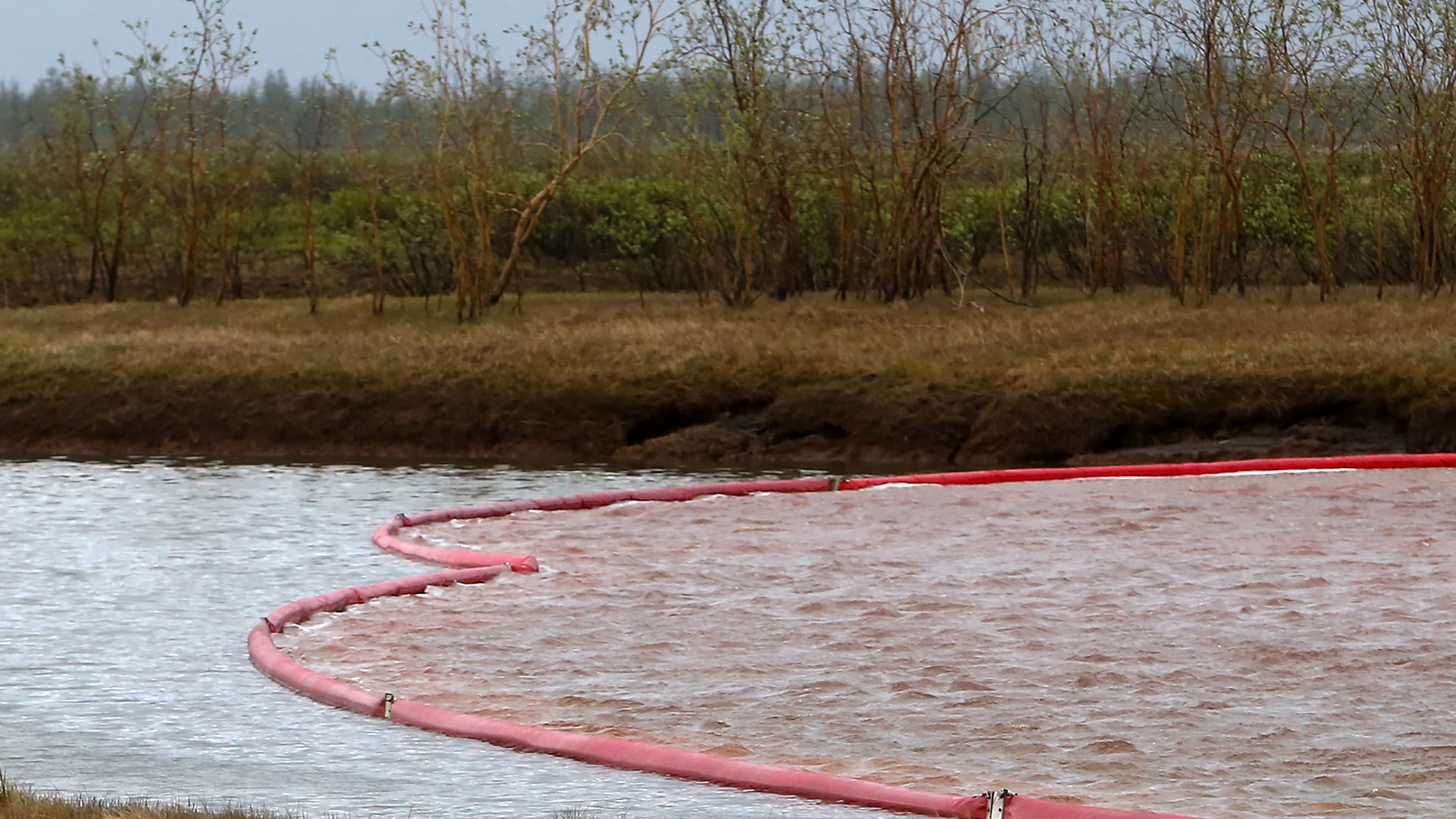Russia battles to clean up ‘worst ever’ oil spill in Arctic
State of emergency declared following leakage of more than 21,000 tons of diesel in Siberia

A free daily email with the biggest news stories of the day – and the best features from TheWeek.com
You are now subscribed
Your newsletter sign-up was successful
Russian officials battling to contain a massive oil spill in the Arctic Circle have warned that the clean-up operation may take years.
President Vladimir Putin has declared a state of emergency over the leakage of more than 21,000 tons of diesel in northern Siberia - “one of the largest oil spills in Russian history”, says Deutsche Welle.
According to the authorities, the spill originated from a storage tank at a thermal power station that “burst last week after settling into permafrost that had stood firm for years but gave way during a warm spring”, The New York Times reports.
The Week
Escape your echo chamber. Get the facts behind the news, plus analysis from multiple perspectives.

Sign up for The Week's Free Newsletters
From our morning news briefing to a weekly Good News Newsletter, get the best of The Week delivered directly to your inbox.
From our morning news briefing to a weekly Good News Newsletter, get the best of The Week delivered directly to your inbox.
Environmental groups are comparing the spill - at a plant operated by a subsidiary of metals giant Norilsk Nickel in the city of Norilsk - to the 1989 Exxon Valdez tanker disaster in Alaska.
The diesel has spread to a freshwater lake near the Arctic Sea “that is a major source of water for the region”, says The Guardian.
And efforts to prevent the spilled fuel from reaching the ocean are being hampered by strong winds, Euronews reports.
Aleksey Chupriyan, Russia’s first deputy emergency minister, said: “Today we clean up the spot at one place, tomorrow at another one. We have to move constantly, and it means moving both people and equipment.”
A free daily email with the biggest news stories of the day – and the best features from TheWeek.com
Meanwhile, investigators have detained the director of the power station and two engineers on suspicion of breaching environmental protection rules.
–––––––––––––––––––––––––––––––For a round-up of the most important stories from around the world - and a concise, refreshing and balanced take on the week’s news agenda - try The Week magazine. Start your trial subscription today –––––––––––––––––––––––––––––––
Norilsk Nickel is owned by the wealthiest man in Russia, Vladimir Potanin, who is worth an estimated $25bn (£19.75bn).
Potanin has said that his company will pay for the clean-up, which is expected to cost an estimated $146m (£115m).
But enviromentalists have warned that the spill may have devastating consequences for local wildlife.
“We are talking about dead fish, polluted plumage of birds and poisoned animals,” said Sergey Verkhovets, coordinator of Arctic projects for WWF Russia.
-
 What are the best investments for beginners?
What are the best investments for beginners?The Explainer Stocks and ETFs and bonds, oh my
-
 What to know before filing your own taxes for the first time
What to know before filing your own taxes for the first timethe explainer Tackle this financial milestone with confidence
-
 The biggest box office flops of the 21st century
The biggest box office flops of the 21st centuryin depth Unnecessary remakes and turgid, expensive CGI-fests highlight this list of these most notorious box-office losers
-
 What happens now that the US-Russia nuclear treaty is expiring?
What happens now that the US-Russia nuclear treaty is expiring?TODAY’S BIG QUESTION Weapons experts worry that the end of the New START treaty marks the beginning of a 21st-century atomic arms race
-
 Epstein files topple law CEO, roil UK government
Epstein files topple law CEO, roil UK governmentSpeed Read Peter Mandelson, Britain’s former ambassador to the US, is caught up in the scandal
-
 Iran and US prepare to meet after skirmishes
Iran and US prepare to meet after skirmishesSpeed Read The incident comes amid heightened tensions in the Middle East
-
 Israel retrieves final hostage’s body from Gaza
Israel retrieves final hostage’s body from GazaSpeed Read The 24-year-old police officer was killed during the initial Hamas attack
-
 China’s Xi targets top general in growing purge
China’s Xi targets top general in growing purgeSpeed Read Zhang Youxia is being investigated over ‘grave violations’ of the law
-
 Ukraine, US and Russia: do rare trilateral talks mean peace is possible?
Ukraine, US and Russia: do rare trilateral talks mean peace is possible?Rush to meet signals potential agreement but scepticism of Russian motives remain
-
 Panama and Canada are negotiating over a crucial copper mine
Panama and Canada are negotiating over a crucial copper mineIn the Spotlight Panama is set to make a final decision on the mine this summer
-
 Why Greenland’s natural resources are nearly impossible to mine
Why Greenland’s natural resources are nearly impossible to mineThe Explainer The country’s natural landscape makes the task extremely difficult